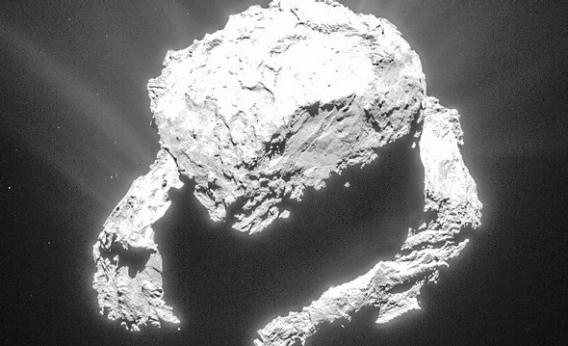Create a free profile to get unlimited access to exclusive videos, sweepstakes, and more!
Life on a Comet? I’m Gonna Go With “No.”

On Sunday, the Guardian published an article about the possibility of life on the comet 67P/Churyumov-Gerasimenko, which is currently being explored by the Rosetta probe. As soon as I heard about this, I knew that these claims were coming from Chandra Wickramasinghe, an astronomer at the University of Cardiff.
Why? Because Wickramasinghe has a history of making outrageous claims about life in meteorites, about the flu virus coming from space (seriously), about SARS coming from space, about red rain in India coming from space … you get the picture. He’s even claimed NASA is covering up evidence of life on Mars. And yet for all these claims, he has very little evidence—or I should say very little good evidence.
For example, he’s had a series of claims about finding diatoms, a type of algae, in meteorites. He’s published pictures of them (in what could charitably be called an iffy journal), saying these fossilized microscopic plants come from space.
The problems with this claim are legion. For one, the diatoms look just like ones found on Earth, today. That makes this far, far more likely they are actually diatoms from Earth that have contaminated his samples—which is supported strongly by the fact that his team apparently didn’t control their samples for contamination very well. And for another it’s not at all clear his rocks were even meteorites in the first place!
All this is prelude to his current claims that the hard, dark crust on the surface of the comet 67P is “not easily explained in terms of prebiotic chemistry.” That is, to be delicate, incorrect. A hard, dark crust is a natural outcome from taking organic molecules (that is, carbon based, not necessarily from life) and exposing them to radiation (like ultraviolet light or subatomic particles in the solar wind) from the Sun. Physical chemist Chris Lee talks about this in an article in Ars Technica, rebutting Wickramasinghe, and points out that this sort of carbon formation is so common it’s a nuisance to be dealt with in the lab all the time.
I find it rather a bit of a jump to go from seeing a hard crust on a comet to claiming it’s evidence for microscopic life. His other claims suffer similar leaps of logic when simpler, more prosaic explanations abound.
The Guardian article is relatively cautious about these claims, saying “Prof Wickramasinghe’s views are regarded as several steps outside the scientific mainstream.” To say the least. Still, most of the article reports the claims straight. Not surprisingly, the awful Daily Mail published a completely credulous article about this, as have several other venues, and the news is getting traction on Twitter and Facebook, which is to be expected.
I don’t expect most journalists (or the public) to be able to be scientifically dissect such claims … however, a Web search on Wickramasinghe’s name would have yielded plenty of articles critiquing his claims just in my own writing, let alone those of many others. I’m glad to see science communicator Rachel Feltman wrote an article criticizing this story, as did the Telegraph. Snopes is on it as well. Maybe these will get some traction now as well.
To be clear, I am not in favor of suppressing speculation or out-of-the mainstream thinking; at times science can progress by those very things. But they have to have some sort of merit, some sort of firm basis from which to grow, and over the years I (and many others) have seen little of that in Wickramasinghe’s claims. I welcome his presentations at scientific meetings where they can be scrutinized, as long as he takes that scrutiny to heart (again, something of which I’ve seen little evidence).
I also know that such scrutiny doesn’t make for as good a story as “Life found on comet!” I don’t have much advice for what we can do about this, either, short of a paradigm shift on how science is presented to the public. With the Internet we’ve already gone through such a shift, and we’re still working through the fallout from it. But I worry … such stories weaken the public’s understanding of science, and may weaken the public trust as well when rebuttals are issued. This is how science works, which is its strength, but that can be seen as a weakness outside of scientific circles, and it’s something scientists—and science communicators—need to think about.


























